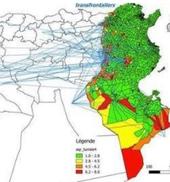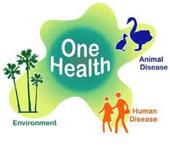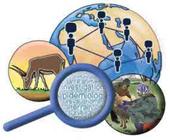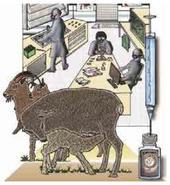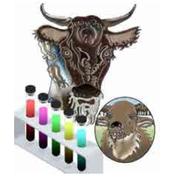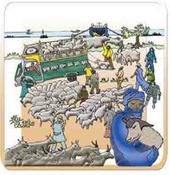Modular courses
Animal health
The modular training courses last from one to three weeks and cover topics such as animal health, food hygiene, animal production, data processing and pedagogical engineering.
Module "Epidemiological surveillance methodology"
Epidemiosurveillance is an essential tool for national veterinary services to obtain reliable health information for making relevant decisions in the control of animal diseases.
To find out more : Download the leaflet
Module "Qualitative and cartographic analysis of risks. Optimisation of systems for surveillance and control of cross-border diseases"
The main objective of this training session is to strengthen the capacities of national actors. The aim is to help veterinary services and other animal health actors to better assess the risks of introduction and spread of animal diseases in the field, through risk-based surveillance systems.
This method can be applied to zoonotic diseases and used by public health experts.
To find out more : Download the leaflet
Module "One Health and integrated approaches to health"
This module is dedicated to the introduction of the "One Health" and "Ecohealth" approaches. The multidisciplinary aspects of these approaches are addressed to enable students to take into account the complexity of socio-ecological systems and their impact on animal and human health. Different disciplines (Ecology, Geography, Anthropology, Sociology) that can contribute to a better understanding of health issues are presented through practical examples that highlight the methods and indicators used in the "One Health" and "EcoHealth" approaches with their advantages and disadvantages.
To find out more : Download the leaflet
Module «Integrated management of wildlife and its health risks in southern countries »
This training provides an overview of integrated wildlife management and the health risks inherent in interactions between wildlife, domestic species and humans analysed from the perspective of different disciplines such as ecology, epidemiology, sociology or economics.
To find out more : Download the leaflet
Module "Field epidemiology"
The intervention territory of field epidemiologists is vast, and its function is to provide rapid and concrete responses to health problems at the population level, in order to inform decisions in the field of animal health. The objective of this module "Epidemiology of intervention" is to train learners capable of applying modern epidemiological approaches to control the epidemic in a population, to detect and investigate outbreaks and to evaluate the impact of control measures on health issues.
To find out more : Download the leaflet
Module "Ecology and integrated vector control"
This module aims to describe the integrated pest management approach, at the livestock, village or total population level (Area-wide Integrated Pest Management), by presenting the main vector control methods (chemical, physical, biological, genetic). The main groups of arthropod vectors presented (tsetse, ticks, culicoids, mosquitoes, mechanical vectors) are the most important in terms of animal health, particularly in tropical areas.
To find out more : Download the leaflet
Module «Workshop on the basics of animal cell culture »
Cell culture is a set of biological techniques used to make cells grow outside their body (ex-vivo) or their original environment. This tool is becoming increasingly necessary to validate protocols before the animal testing stage.
To find out more : Download the leaflet
Module "Diagnostic techniques for Peste des petits ruminants"
Peste des petits ruminants is a highly contagious viral infection affecting small domestic and wild ruminants. In livestock areas where the disease is enzootic, it causes significant economic losses.
This module focuses on the teaching of the different classical methods used for serological and molecular diagnosis of the PPR virus. It presents standard protocols and procedures as well as instructions for the use of the necessary equipment
To find out more : Download the leaflet
Module "Diagnostic techniques for CBPP (and/or CCPP)"
This module teaches how to perform serological analyses using the cELISA technique (IDEXX), how to acquire the basics of the quality approach in this field and how to interpret the results; how to isolate and identify the CBPP agent (CCPP) using conventional techniques (biochemical tests, growth inhibition) and analyse the difficulties encountered in the field; how to titrate a vaccine against CBPP (CCPP); how to describe the PCR technique principles applied to CBPP (CCPP) for rapid diagnosis.
To find out more : Download the leaflet
Module "Animal mobility"
In the context of research or development work in the fields of animal health, livestock or forestry systems, it becomes crucial to collect information on animal mobility, especially when dedicated databases are lacking. This module illustrates the different possible sources of information up to the definition of survey protocols and the processing of information on animal flows.
To find out more : Download the leaflet


